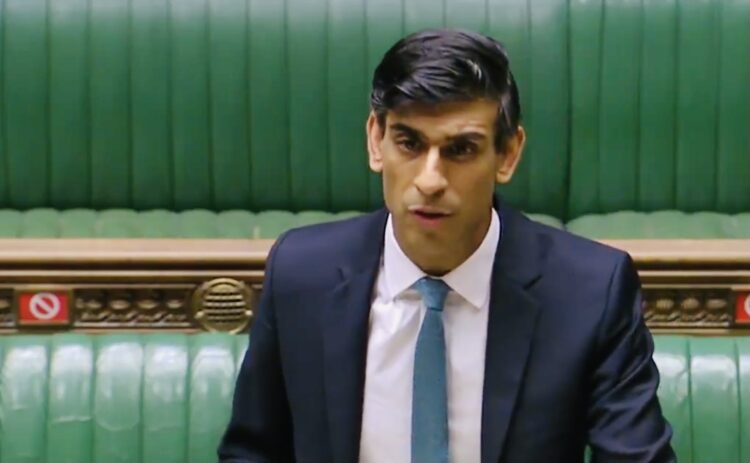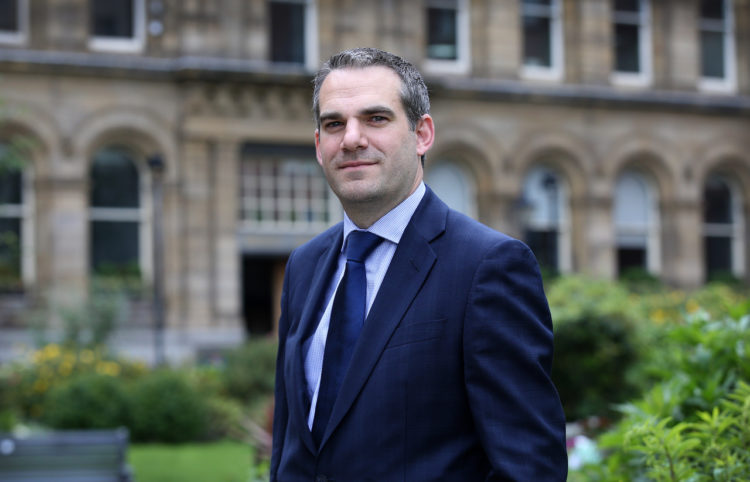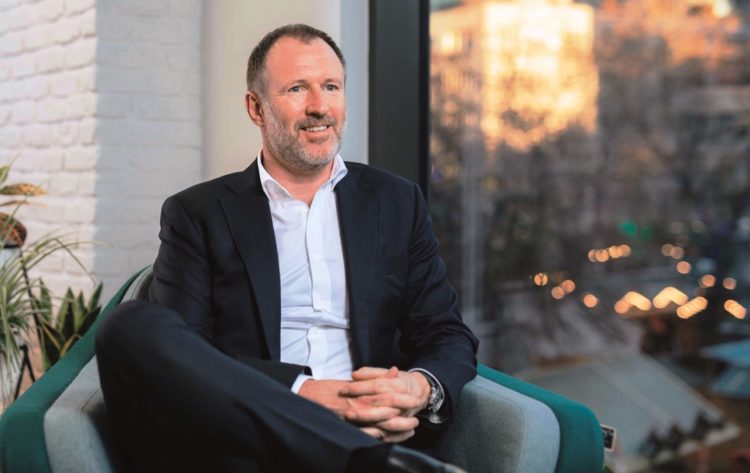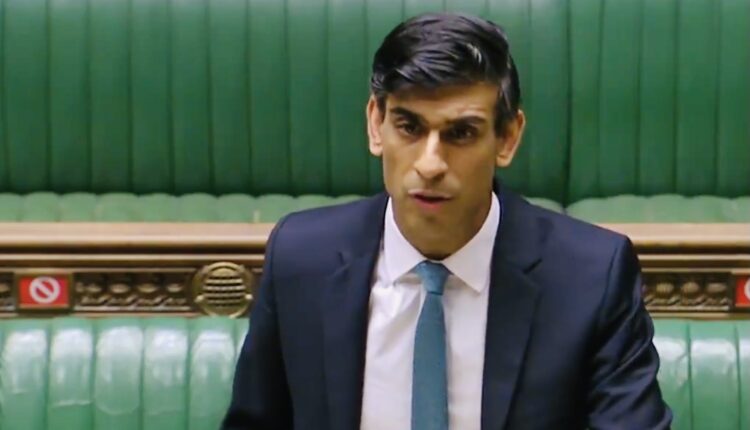Northern Powerhouse director Henri Murison says it should be Metro Mayors such as Steve Rotheram who decide how the £4bn levelling-up fund is spent, not Whitehall mandarins. Tony McDonough reports

A new UK infrastructure bank is to be set up in the North of England and a new £4bn “levelling-up” fund will finance regional infrastructure projects, Chancellor Rishi Sunak has announced.
But the measures, unveiled in Mr Sunak’s Spending Review, have come under fire from the director of the Northern Powerhouse Partnerships Henri Murison, who claims the it should be Metro Mayors such as Steve Rotheram who decide where it is spent, not the Government’
Mr Murison said: “It feels like a hollow victory to create a £4bn levelling-up fund when Whitehall will still get to decide how it is spent. It is disappointing we are yet to see targeted investment at the biggest barriers to drive up productivity.
“This can only be done by trusting direct elected Metro Mayors and their combined authorities. This is the only way we will close the North-South divide.”
In his address to the House of Commons on Wednesday, Mr Sunak painted a grim picture of the economy and the public finances in the wake of the COVID-19 pandemic, referring to “long-term scarring’ of the UK economy.
He said the UK economy is expected to shrink by 11.5% this year and unemployment is expected to reach 7.5% next spring, with 2.6m people out of work. However, the Office for Budget Responsibility has forecast that growth will bounce back by 5.5% in 2021 and 6.6% in 2022.
Government borrowing is forecast to hit £394bn this year, equivalent to 19% of GDP. This is the highest ever level in peacetime. The UK debt will be equivalent to 91.9% of GDP this year and rise to 97.5% of GDP in 2025/26.
Mr Sunak announced a freeze on public sector pay for next year although more than 2m earning less than £24,000 a year will get a minimum £250 increase. More than a million doctors, nurses and NHS workers will also see a rise. The National Living wage is to rise by 2.2% to £8.91 an hour and 23 and 24-year olds will qualify for the living wage for the first time.
There will be a new £4.6bn package to help people back to work, including £2.6bn for the Restart scheme and £1.6bn for the Kickstart scheme to subsidise jobs for young people. And he announced a £375m skills package, including £138m to provide Lifetime Skills Guarantee.
In a controversial move the Chancellor broke a manifesto promise by cutting the overseas aid budget from 0.7% of GDP to 0.5%. The decision prompted the resignation of Foreign Office minister Lady Sugg who described the cut as “fundamentally wrong”.
Mr Sunak said: “This is the largest fall in output for more than 300 years… the economic damage is likely to be lasting. Long-term scarring means that in 2025 the UK economy will be 3% smaller than expected in the March Budget.
“This is an economic emergency. That is why we have taken, and continue to take extraordinary measures to protect people’s jobs and incomes.”

Frank McKenna, chief executive of lobbying organisation Downtown in Business, called the Spending Review a “damp squib”, adding: “The Chancellor’s statement on spending for the next 12 months has failed to come up to expectations. We were hoping for significant proposals which would drive the economy, help key sectors like hospitality, and build an infrastructure fit for the 21st century. Unfortunately, we haven’t got any of that.
“The Chancellor is creating a £4bn Levelling Up Fund, which everyone in politics knows is simply there to help Conservative MPs in Red Wall constituencies. It should be about smart infrastructure decisions, instead it looks like pork-barrel politics.
“We are still waiting for the Government’s Infrastructure Finance Review response, which could help fund a lot of the infrastructure investment that we need. And there is still no mention of the Government’s Devolution and Local Recovery White Paper.
“I welcome his announcement that an Infrastructure Bank, will be established, this is something we at Downtown had been calling for, and I am pleased that it will be based in the North of England, again, we had been calling for more civil service jobs brought north.
“I would give the Chancellor five out of 10 for this Spending Review at most. He’s committed to funding some core issues, but there is no strong economic stimulus, no strong political direction, it is a damp squib.”

Paul Cherpeau, chief executive of Liverpool Chamber of Commerce welcomed the additional investment announced by the Chancellor, adding there were “no quick fixes” to the damage that COVID has wreaked on the economy.
He said: “The measures announced to level up the economy in the north, including increased investment through the UK infrastructure bank, should allow Liverpool to unlock greater investment opportunities, as well as capitalising on the strengths of existing businesses.
“We wait to see the more details of the Shared Prosperity Fund which will be particularly important in this region. The increased investment and commitment to deliver a net zero economy, supporting a “green” recovery, also provides a key opportunity which we are well placed to exploit in the city region.
“Underpinning our longer term economic growth however must be a commitment to making sure that we have the skills and training in place to take advantage of these opportunities, even more so in a post Brexit economy, to allow us to compete fairly and successfully.
“Without that support these announcements will have a limited impact on the longer term prosperity of our city region.”

The commitment to spend more on the regions was welcomed by Chris Oglesby, chef executive of Bruntwood, one of Liverpool’s biggest providers of office space. But he repeated Henri Murison’s view that decisions on how the money is spent should be made regionally.
He said: “The need for long-term, visionary spending in the areas that need it most has only been heightened by the pandemic, which has had a disproportionate impact on historically underfunded regions like the Midlands and the North.
“More money for the UK’s regions is welcome but won’t be as effective or deployed as rapidly as we need it to be unless accompanied by greater powers for our civic leaders. Levelling up, to be truly meaningful, has got to be more than about money but control too.”

The prospect of the National Infrastructure Bank being headquartered in the North indicates a “a shift in the centre of gravity”, according to Angela Cross, partner and head of tax in the North West for accountancy firm BDO.
She said: “When we surveyed business leaders earlier this month, 47% of mid-sized businesses in the North West felt that COVID-19 will further widen the UK’s north-south economic gap.
“Business owners have identified a need for infrastructure investment across the UK with a focus on shovel-ready, high-impact projects that meet the specific needs of each region. Today, the Chancellor made encouraging announcements with the launch of a £4bn Levelling up Fund
“The prospect of the National Infrastructure Bank being headquartered in the North is also a positive indicator that there’s a shift in the centre of gravity and the Government is investing in rethinking the regions.”
Carl Williams, North West managing partner at accountants Grant Thornton, said : “It was pleasing to hear of the plans for a new Infrastructure Bank to be headquartered in the North, alongside the Chancellor’s commitment to create a Northern base for the Treasury.
“We eagerly await further news on these exciting initiatives, which could have a significant impact on business confidence and investment as our regional economies recover from the pandemic.”
Graham Wright, a tax partner at EY, said: “The government says it is moving away from a fragmented landscape with multiple funding streams but the regions will potentially once again find themselves bidding against each other for one pot of money. Managed by three government departments and with projects needing approval from the local MP the approach seems at odds with a broader objective of devolving power and funding decisions.
“The combination of the well trailed creation of a National Infrastructure Bank, as part of the wider £100bn infrastructure strategy, along with changes to the Green Book to prioritise investment in more deprived regions and in sustainable infrastructure, and the Treasury’s new Northern HQ, will create a significant number of jobs and are certainly good news for the North.”

